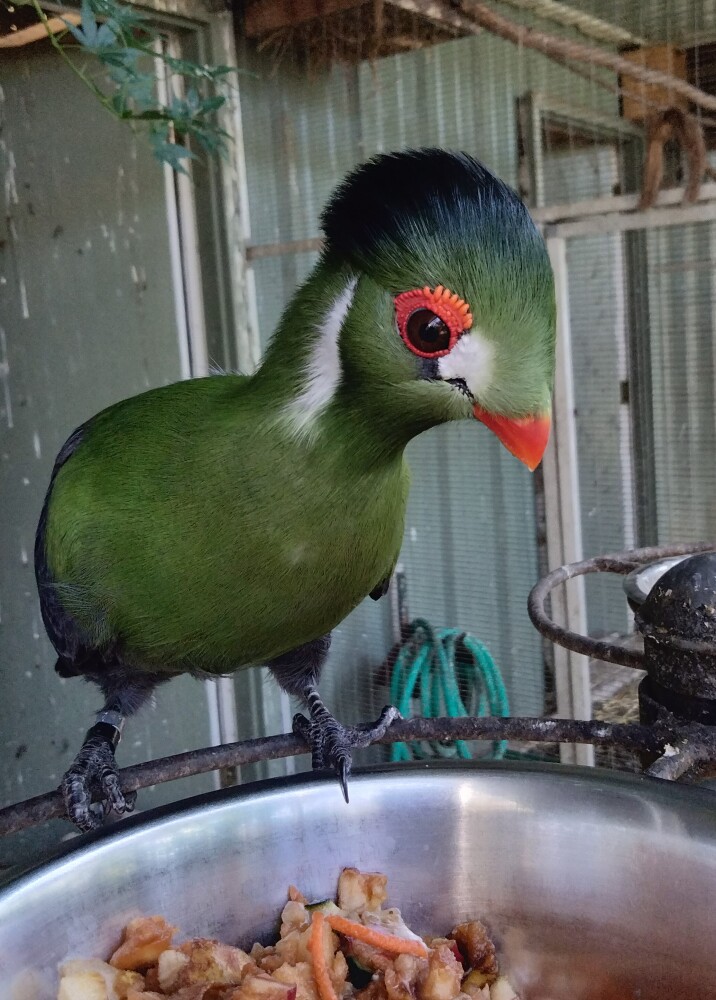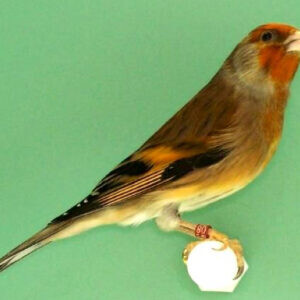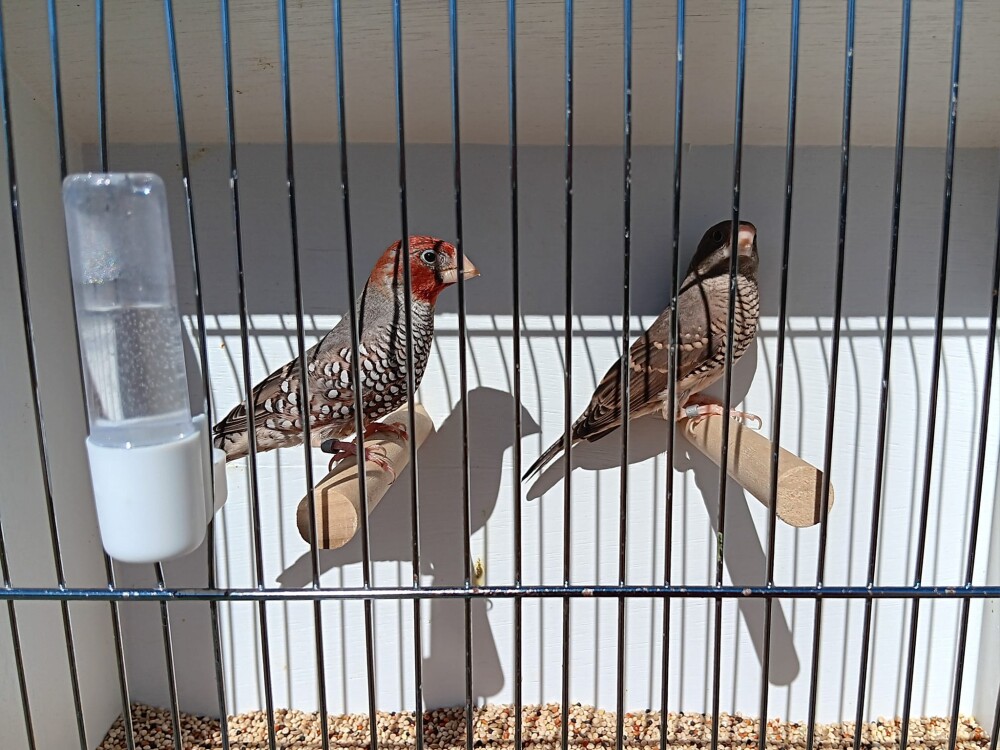Finch for Sale
Finches are small birds, often kept as pets. In fact, the Finch is the smallest common pet bird in the world! Finches' classification has been a subject of debate for many years. Because it eats mainly seed, it is often classified as a waxbill or hardbill, but it's more commonly referred to as a softbill bird. It is classified as a softbill currently based on the fact that it is relative to the parrot, which is classified as a hookbill. If not a hookbill, it automatically classifies as a softbill.
Cuban Melodious Finch
- Name: Bill
- Posted: 01/01/2026
- Phone: 2673046162
- Email: Email Seller
- Location: Florida
I have 2 male cuban melodious finch, siblings. If you only want one, They're $225.00ea. Firm! If you want both, I'll do $400.00 for both. As of now they still young enough to be shipped together in one box. They're still getting along together in the...

Softbills for Sale: Turacos, Tanagers, Honeycreepers
- Name: Davis Lund Aviaries
- Posted: 09/20/2025
- Phone: Prefer email
- Email: Email Seller
- Location: Oregon
- Website: https://dlaviaries.wordpress.com
White Cheek Turacos: Parent raised, aviary birds. $600 for 2024 bonded, egg laying pair, $550 for 2025 pairs, $200 extra 2025 male. All pairs made from different parents. Blue Grey Tanagers - 2024 females $300 (Two available) Green Honeycreepe...

Hybrid Canary x Siberian Golfinch
- Price: $400.00
- Name: GUSTAVO LEMA
- Posted: 09/18/2025
- Phone: 562-206-5202
- Email: Email Seller
- Location: California
I have a Hybrid Siberian Goldfinch x Canary for sale for a friend of mine, Please contact him, his name is Miguel, He is located in Long Beach, CA. Photos are only for reference.

African red-headed finches
- Name: Bailey Henderson
- Posted: 08/30/2025
- Phone: 636-209-2389
- Email: Email Seller
- Location: Missouri
Hi, I have three proven pairs of African red-headed finches (2022-2023) and three 2024 and 2025 daughters from them. All the birds are wild-type but one pair occasionally has yellow-headed chicks. $240 per pair or $850 for the whole group of nine bi...

Silver Pheasant Pairs
- Price: $150.00
- Name: John
- Posted: 08/18/2025
- Phone: 7162442404
- Email: Email Seller
- Location: New York
- Website: Http//: www.woodsideloft.com
Juvenile Silver Pheasant Pairs currently available. The Pheasants in the picture are some of what the juvenile pheasants have hatched from. Please Contact by text, call or email. It will be tough to find healthier stock I assure that. Local pickup is...
-1000x1000-1URrP3TW2b.jpeg)
Various exotic finches
- Price: $50.00
- Name: Brandon Ackerman
- Posted: 07/29/2025
- Phone: 8044261145
- Email: Email Seller
- Location: Virginia
- Website: www.brandonexotic.com
Red Bishop Finches ( Males ane Females ) 350 pair m 200 f 150 Tri Color Munia Finch 100 Bronze Wing Manikin Finches 50 Spice Finches 50 Indian Silverbill Finches 50 Zebra Doves 150 Tangerine Ringneck Doves 60 Diamond Doves 100 Lovebirds 300/p...

Java rice finches
- Name: Bobby
- Posted: 06/14/2025
- Email: Email Seller
- Location: Arizona
We have fledgling Java rice finches available.

European goldfinch
- Name: Martin
- Posted: 05/23/2025
- Phone: (209) 404-3025
- Email: Email Seller
- Location: California
I have a few European goldfinches available for sale? If interested, call or text for faster respond 209 404-3025 if no answer please leave a message. Thank you shipping available? USPS $95
Types of Finch for Sale
There are a wide variety of Finches, both in the pet trade and found wild throughout the world. There are hundreds of Finch species! They vary from 3”-8” from head to tail and are usually quite colorful. In captivity, your Finch can live as long as 5-10 years. Few have been recorded as living as long as 27! 4 main families comprise all Finches: Fringillidae, Estrildidae, Ploceidae, and Passeridae. Like all bird species, they are classified by their distinctions. These traits can be physical attributes, behaviors, or origins distinctions for other birds.
Finches in Captivity
Both Canaries and Finches are popular small bird species kept in captivity as pets. Finches are perhaps more popular due to their smaller voices. They vocalize just as much as the next species, but because of the small size of their bodies, their voices carry much less. For owners in apartments or condos, they are the best option. Of those who keep finches in small living quarters, most say they can hear their vocalization just outside the room they are kept, but that the sounds are therapeutic and they enjoy spending as much time in the same room as possible.
Finch Behavior
As pets, they are interesting and cheerful but are more bird-oriented than people-oriented so they are less likely to be finger tamed. Unlike Parrots who need handling every single day, Finches prefer not to be handled at all. Instead, they prefer the company of other Finches. Human handling will actually only cause your Finch stress. They should only be handled to address their health or medical care. Some owners really enjoy their undemanding demeanor. They are especially good pets for busy people, in addition to being quiet apartment dwellers. They share many traits with their close relative, the Parrot, without the constant care and demand. They are also cost-effective pets, costing much less to care for than a Parrot or other softbill bird. Picking out your new companion can also be an enjoyable adventure, as there are many colors and varieties of finches to choose from.
While you are choosing a Finch, you may wish to pick out some “roommates” for it, as most captive pet birds need socialization with their own kind to thrive in a human home. Finches that don't have “roommates” may fall ill, mentally and physically, so be sure to provide your Finch the companionship of another.
Availability of Finches
Some common Finch varieties available from breeders and pet distributors are African Silver-bill Finch, Blue-capped Cordon Bleu Finch, Blue-faced Parrot Finch, Crimson-crowned Weaver, Diamond Sparrow, Lady Gouldian Finch, Orange Weaver, Owl Finch, Paradise Whydah, Pintail Whydah, Red-faced Star Finch, Red-headed Parrot Finch, Society Finch, Zebra Finch, Strawberry Finch, and Spice Finch.
Because they are so widely available, ample research is also available to keepers and breeders, so owners quickly can enjoy becoming “Finch experts” if they wish to consider their study beyond their species and experience.
Specific Finch Care
Your finch needs adequate space to fly in its aviary so it's recommended they have cages as large as 12” x 18” for a pair. Their flights are short, so this is a good amount of space for them. Inside their habitat, you'll provide their food, water, a bathing area, and a nest box to sleep inside. Because mites plague the Finch sometimes, you can place a “bird protector” disk on the side of the cage. Grit paper is used as the base of the cage. Finches need their claws clipped, but you need to be sure not to clip their nerves in the process. Since you will already need to provide them perches, you can use tree branches that can serve as a way of naturally wearing down their sharp claws. Emulating a species' natural habitat as closely as possible is always a good practice, anyway. The perfect placement of its cage is about 6 feet off the ground, hung from a stand or wall bracket because you will want it near a wall to give it the illusion of security. Good light and ventilation without drafts are optimal. Per usual with bird species, you will want to be aware of the weather conditions they can withstand. Finch cages should not be exposed to direct sunlight and can withstand temperatures from 40 degrees Fahrenheit to 70 degrees Fahrenheit. Their cages should be covered at night to prevent sleep disturbance. Outdoor aviaries are also a nice addition to your pet care, as long as the weather is permitting and there are no openings wider than 3/8” so mice cannot make a meal of your Finch, or vice versa.
You must provide fresh food and water daily for your Finch to prevent illness and stress. Basic cage cleaning can be carried out daily and cleaning the bottom of the cage once every three days will suffice. Unlike some bird species, Finches require few toys. One mirror or toy and a perch will do just fine, and you can swap them periodically to keep it fresh. All toys safe for Parakeets are also safe for Finches, so keep that in mind when shopping. What Finches really enjoy is flight, so providing them enough space to exercise can make the difference between a happy Finch or a stressed one. In their natural habits, Finches enjoy rolling in the damp grass to bathe themselves. You can treat your Finch by giving it damp grasses in the bottom of his/her cage for a few hours. Beware of leaving any bathing sources for too long or allowing your bird to remain wet.
Feeding your Finch is somewhat simple. Finch seed is something your Finch will eat daily and is made easily available by pet stores. A single finch will only eat one teaspoon of seed per day, so feeding your Finch is pretty inexpensive compared to other bird varieties. During cold months or molting seasons, your Finch might require a little more food. You should supplement your Finch's diet with sprouted seed and millet on occasion. For protein, you can offer your Finch egg food, milk-soaked whole wheat, insects, and even dry dog food. For birds who lack direct sunlight, you will need to supplement Vitamin D. For their break and eggshell health during breeding, offer cuttlebone for Calcium and digestion. You can also offer treats sparingly; spinach, chickweed, carrot tops, dandelions, leaf lettuce, apple or pear.
Reproduction in captivity varies from species to species. Some breed very easily such as the Zebra or Society Finch, but others are much more finicky and have little success.

Comments